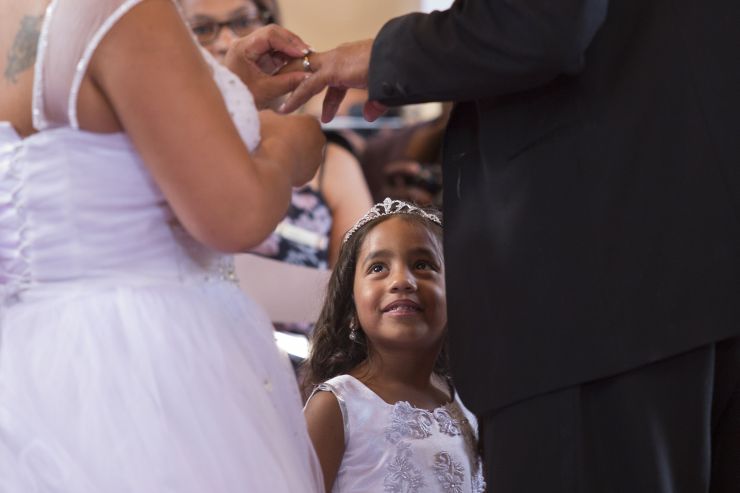TORONTO — First comes love, then comes marriage, then comes the baby in the baby carriage. At least that’s how it used to go. Nowadays, life’s milestones — which also include graduating and buying a home — aren’t always bound by that order.

Thirty-year-old high school sweethearts Ashley Kohut and her partner Shawn Demaio recently got engaged after 11 years together. They chose to first buy a house, which they did at 22. Then they had two kids, who are now one and five.
“For us, it was more, ‘let’s do what feels right for us to do, not what society expects us to do’,” said Kohut, adding that weddings cost a lot of money. She estimates $30,000 to $40,000.
READ MORE: Canadians plan for $15K wedding budget, 2014 study shows
Still, she admits there has been a lot of pressure to marry from both family and friends, who “have gone the traditional route with the ‘proper’ sequence.” At the end of the day, though, it doesn’t matter.
“We live in 2015. This isn’t our parents’ day and age.”
Kohut’s case is far from an anomaly. Cultural anthropologist Johanna Faigelman has studied millennials (aka Generation Y or those born between 1981 to 1997) extensively as the founder of Human Branding Inc., a Toronto-based market research and consulting firm. She believes there’s been a very clear shift in the order that this age group is going through life’s “rites of passage.”
“They’re becoming adults in a very different way than their parents did,” Faigelman explained. “They’re taking the attitude of, ‘you know what, our realities are different, the old rules of the previous generations don’t apply to us. We’re actually going to redefine the order that we do things in.'”
A TD survey released this month would back that observation up. It found that more than 50 per cent of millennials have completed or are on track to complete their life’s milestones in a different order than they originally expected.
What’s behind the shift?

Get weekly money news
“Partly it’s economically driven in the U.S. and in Canada but partly it’s also philosophically driven,” Faigelman said.
Money
There’s no denying that millennials face entirely different financial circumstances than their parents had to deal with.
“The real cost of home ownership in Canada has increased significantly since the time when baby boomers and Generation X were purchasing their first homes,” a 2014 BMO report stated. And, unfortunately, incomes haven’t kept pace.
READ MORE: Home ownership for millennials – are they dreaming?
Research from Goldman Sachs this year showed that, in the U.S., 93 per cent of 18- to 34-year-old renters plan to buy a home some day, but more choose to live at home with their parents than ever before.
It also suggested peak home-buying years for young Americans have been pushed from 25 to 45 years old there. In Toronto, the Canada Mortgage and Housing Corporation estimated last year that the average age of a first-time homebuyer is about 37.
READ MORE: 4 dos and don’ts of buying your first home
Mindframe
The different path many millennials are on also seems to be connected to the fact that many of them just have a different way of viewing life, said Faigelman.
For one thing, they’re not too keen on the idea of “you must do things this way” associated with religious institutions, which tend to preach the “marriage before babies” philosophy.
“I would argue that millennials are very in touch with the notion of spirituality and of having a greater purpose in life, of soul searching and exploring themselves,” said Faigelman. “Millennials are more likely to discover a religion that sort of suits them, than having one placed upon them and following it blindly.”
Similarly, Faigelman said many of them seem to be forgoing the traditional notions of success in favour of their own redefined version of it. That version often includes more importance placed on experiences (like travel) than physical, tangible possessions (like a home).
“We’re seeing a real transferring of prioritization of life experience and knowledge, and that being almost a definition of luxury versus the old definition — which would be working in the same job for ten years…and having 1.5 kids and a dog and a house in the suburbs.”
Research has shown work-life balance is also extremely important to this age group. So, some may opt for contract work that gives them flexibility to travel. Others may look for a job that lets them take a long lunch to go to the gym or log off for a couple hours to pick up their kids, and then log back on in the evening to finish work from home.
READ MORE: Millennials and the changing world of work
Kohut, who works in real estate, admitted she enjoys being able to scale back her hours without a financial burden hanging over her head.
The millennials’ legacy
Much like the baby boomers blazed trails, revolutionizing society through protests, Faigelman believes millennials will leave their own lasting impact.
“It’ll have more fluidity than it ever has before, and that will sort of be the lasting legacy of millennials.”
Here’s some advice from TD on how to be financially prepared to navigate through life’s milestones:






Comments